Pedals of Progress: How Richmond Waldorf School Built its Bike Program
RWS is incredibly proud that our Bike Program is featured in the Spring 2024 edition of School Renewal, a Journal for Waldorf Education. Below is an unabridged version of the article we submitted, with some additional information about the growth and expansion of our program at our new building. To learn more about Richmond Waldorf School, watch our latest video.
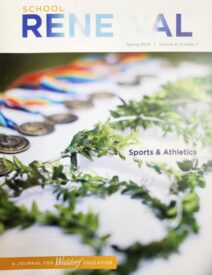
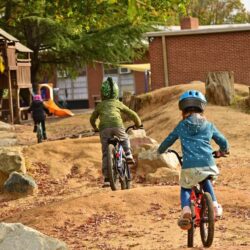
Glenn Amey has been a Waldorf parent for years and has always been up for helping out, which is what he found himself doing one morning ten years ago at Richmond Waldorf School (RWS) – sanding desks in his son’s 1st grade classroom. Glenn’s wife, Letitia Amey, has taught at RWS since 2002 and their children all attended. As Glenn explains, in 2013 he suggested to now retired RWS Class Teacher, Roberto Trostli, he could come in once a week to get the children riding bikes. His goal was to get students away from training wheels and do outings since they were close to a city park. From there they could move into mountain biking and off-road riding and even eventually, Glenn could lead them on a big biking trip in 8th grade.
Initially, some families were resistant – their children could ride a bike, why did they need a class? However, Roberto saw the potential of the initiative and decided to create a Biking Program with two main components: the first was city biking and learning safety skills and the second was developing skills that would build trail biking proficiency. At first, the class worked on campus for forty-five minutes weekly. Some students knew how to ride while others did not, and Glenn gently encouraged them while teaching what they needed to do to be safe. By the end of the year, all the 1st graders were proficient and able to pedal, brake, and steer. The next year, they worked on skills at nearby tennis courts, with Glenn focused on giving each child individually custom-tailored challenges.
A New Building, New Opportunities
In 2017 RWS purchased its current building, in the heart of Richmond and asked Glenn to be the Part Time Biking Instructor. He realized that if the Biking Program stood a chance of really soaring, he needed to take the position. In Glenn’s vision, the next task was to build a bike track on campus. He utilized his connections within the local community and got an “in” with the Riverview Cemetery, who gave excess dirt that is especially durable and packs very hard. A RWS family with a dump trailer came in handy, along with local nonprofits who brought and funded equipment to move things to the next level. Volunteerism and philanthropy were responsible for the majority of bikes, equipment, and track investments.
Originally, the bike track was envisioned for older students, but Early Childhood and lower grades have benefited the most. Younger bikers need to get advanced more efficiently and the course does that with slopes that force the students to use balance quickly but very safely. Boulders were purchased to enhance the track even more– in Glenn’s mind, he wanted the track to look and feel amazing as the children moved through it.
Today the Biking Program at Richmond Waldorf school involves one weekly biking class in Grades 1 – 8, and for Early Childhood classes, two 6-week blocks of weekly Biking. Children learn how to ride, but the idea isn’t just to teach them. Glenn explained that he really tries to instill satisfaction and the sense of improving – that there is always a “next level.” Students receive individualized instruction as they ride, building skills and hitting different milestones while being aware of their unique needs. For younger or new students, it begins on campus where Glenn can teach basic biking and safety skills. As the students move into the Grades, they take off-campus rides accompanied by two instructors. Glenn’s approach, especially with new bikers, is individualized– every child is at a different pace and is constantly progressing. It’s not a one-size fits all approach – the only way the children will advance is if you identify what each child needs.
The Biking Program: Curriculum with a Waldorf Lens
From a developmental perspective, RWS Class Teacher Katie Bullington explains how much biking makes its way into the classroom. Biking helps to improve motor integration, which helps support activities that require hand-eye coordination and balance, like tracking from the board to paper or playing an instrument.
While biking, students practice proprioception, or conceptualizing where their bodies are in space, which translates to times where students must organize their workspace and maintain an awareness of their body in relation to others. This has huge social implications – strengthening proprioception aids in self-regulation, attention and focus, and can bring calm to those prone to anxiety. Both motor integration and proprioception are important to further brain development and overall cognitive functioning.
Biking requires bilateral coordination, the ability to use both sides of the body at the same time. When both hemispheres of the brain are communicating, it makes it possible to cross the body’s midline which applies in academic tasks like reading and writing. And the Biking curriculum has also blended into the classroom’s curriculum, as Roberto Trostli’s third graders experienced. For their shelter project, they had an inspired idea: build RWS a bike shed!
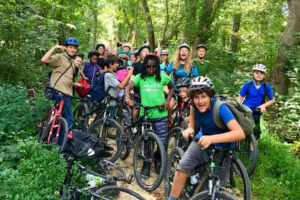
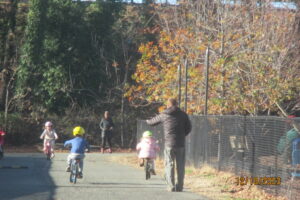
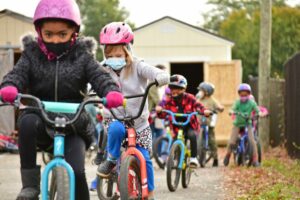
The Many Lessons of Biking
Biking promotes self-confidence and independence, two very important capacities that have wide-ranging benefits for kids as resilient and courageous learners. It’s a powerful kinesthetic activity that reinforces that hard things produce enjoyable results. Resiliency comes forward as well through bike maintenance – students are taught how to do their own repairs. This came in handy many times on longer biking trips, and being empowered to fix something yourself creates tremendous self-sufficiency.
Letitia Amey recalled in 2019 when the 7th and 8th graders took a one-hundred-mile bike ride, there were some challenging moments biking, camping, and working together, but the children conquered every obstacle that came their way. In her words, what is so wonderful about biking is that it’s a time when everyone in class can feel successful. Biking is a lifelong skill and can also be a social experience where kids let out energy and let go of whatever might have happened in the day. She continues, “it’s a less competitive activity in such a competitive world – it’s nice to have something that’s more of a supportive, community building physical activity.”
Additionally, with RWS’s urban campus, students can see the city differently. Not only do they explore neighborhoods, but they visit industrial areas and notice new development. There’s also easier access to businesses, with end-of-year celebratory milestones, like stops for ice cream to look forward to. Service-oriented work benefits too, with middle school classes able to get on their bikes to visit nonprofit neighborhood partners.
When reflecting on the moment when “it all clicks” for new bikers, Glenn says sometimes they can be really expressive. As he’s letting go – but still there beside them – you can see it, or they’ll say something like, ‘I’m really doing it!’ or just have a huge smile. An avid biker himself and the owner of The Journeyman’s Adventure Company, a specialized bicycle shop focused on traveling by bike, Glenn says, “I’ve done a couple of biking tours, and when I come back I try to talk about it to the kids. And maybe it’s abstract to tell them that I went to Costa Rica. But I like to show them that you can do this your whole life and you can see the world by bicycle if you choose to.”
